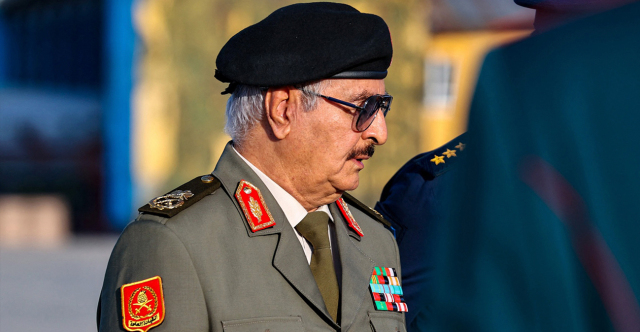Athens is working to revive discussions regarding the “Libya file,” as Libya remains a significant “black hole” for both regional security and Greek foreign policy, especially since 2019 when Libya’s interim government entered into the Turkey-Libya Memorandum of Understanding with President Erdoğan.
Prior to the Libyan Parliament in Eastern Libya considering ratification of the Memorandum, Athens had already devised a plan to reconnect with both Prime Minister Dbeibah’s administration in Tripoli and influential figures in Eastern Libya: Parliamentary Speaker Aguila Saleh and General Khalifa Haftar.
Significant diplomatic efforts have been made (including a meeting between Greek Ambassador N. Garilidis and the Libyan Foreign Minister last week) to facilitate a visit by Greek Foreign Minister Giorgos Gerapetritis to Tripoli in June. This would mark the first high-level visit since Prime Minister Kyriakos Mitsotakis and then-Foreign Minister Nikos Dendias’ trip to the Libyan capital in April 2021.
Relations soured after a tense moment during Dendias’ visit in November 2022, when he declined to meet his Libyan counterpart at the airport. He visited to speak with Presidential Council head Mohamed al-Menfi but canceled due to the recent signing of another Memorandum with Turkey concerning the exploitation of Libya’s hydrocarbons by Turkish company TPAO. Dendias subsequently traveled to Tobruk to meet with Aguila Saleh, leading to a prolonged freeze in relations.
In 2019, Athens was taken by surprise by the Turkey-Libya Memorandum despite prior warnings, relying initially on Egypt and Eastern Libyan authorities—who opposed the agreement for legal and political reasons—to counter what was perceived as an attempt to infringe upon Greece’s continental shelf. Greece argued that the Memorandum was invalid as it was signed by an unelected government and had not been ratified by the Tobruk-based Parliament, in addition to its breaches of the Law of the Sea.
Following the 2022 incident, relations with Tripoli remained stagnant, and those with Eastern Libya also declined.
Haftar’s Son Visits
Recently, it was reported that a private jet linked to the Haftar family sought a flight permit from Benghazi. Diplomatic sources confirmed Al-Saddiq, one of General Haftar’s sons, was visiting Athens for a private 24-hour stay as part of a family vacation en route to another destination.
Though Al-Saddiq, involved primarily in agriculture, is one of the less prominent siblings, there were no official meetings in Athens during his visit, contrary to some reports.
Importance of Relations
Given Libya’s geographical closeness, even minimal diplomatic interaction is crucial—not only for maritime issues but also for managing migration. Libya has emerged as the main departure point for illegal migration to Greece, underscoring the need for open communication.
This context offers Greece leverage as Libya seeks more EU support. Additionally, Greece’s non-permanent membership in the UN Security Council positions it to influence decisions related to Libya. A new UN initiative to resolve Libya’s political situation is anticipated to be voted on soon.
If security conditions permit, Gerapetritis’ mission will be challenging, as he will need to navigate relations between Tripoli and Tobruk.
The Libyan Parliament’s recent move to create a committee to evaluate the Turkey-Libya Memorandum serves as both a warning to Athens and a nod to Ankara, highlighting the extent of Turkish influence in Libya, which has now permeated even Eastern Libya.
Turkish Influence
Over the past two years, Turkey has significantly strengthened ties with both Saleh and General Haftar, who have made official visits to Ankara. Turkey has even reopened its consulate in Benghazi, and in April, Haftar’s son, commander of the Libyan Liberation Army, was welcomed with honors by Turkish Defense Minister Yaşar Güler.
Meanwhile, the U.S. has begun engaging with Haftar’s camp, despite his close connections to Moscow. At the same time, Egypt—previously critical of Dbeibah’s government—has started formal discussions with Tripoli while maintaining its influence in Eastern Libya.
Any visit by a Greek Foreign Minister to Tripoli should be accompanied by a trip to Eastern Libya to avoid the perception of bias in Libya’s ongoing civil conflict. This balanced diplomatic approach has become standard protocol, with many officials visiting both Tripoli and Benghazi–Al Qubbah.
Despite the unpredictable nature of Libya’s internal dynamics and the distant prospect of elections leading to a legitimate government, Athens should seize the opportunity to establish a cooperative framework on migration with EU involvement and broaden discussions on bilateral relations, including the maritime zones issue.
A Catch-Up Game
Libya’s recent maritime block demarcation respected the median line established by Greece under the Maniatis Law, avoiding any challenges to it or claims on areas of the Greek continental shelf affected by the Turkey-Libya Memorandum.
Furthermore, there was little reaction from Greece when it announced licensing for two offshore blocks south of Crete, which align with Greece’s median line but overlap with regions claimed by the Turkey-Libya Memorandum. Egypt also dismissed Libya’s maritime delimitation suggestion following the Turkey-Libya agreement, revealing a de facto situation that favors Greece’s position.
In its letters to the UN in 2019 and 2020, Libya expressed interest in negotiating a maritime boundary agreement with Greece. Athens should not overlook this public commitment from Tripoli at the UN; even if the Dbeibah government is interim and contested, Greece should pursue renewed commitment to initiate preliminary delimitation talks.
If these discussions do not succeed, Greece should consider referring the dispute to the International Court of Justice in The Hague, where Libya has previously brought similar cases against Malta and Tunisia.
For all initiatives, assuming conditions allow, Athens must also coordinate with Eastern Libya to prevent the impression of siding with Dbeibah in the internal conflict, clarifying Greece’s aim to interact institutionally with the entire Libyan state.
Failing this, there is a risk that Haftar and Saleh—who have rekindled ties with Ankara—might initiate unilateral actions.
Additionally, Eastern Libya plays a crucial role in managing migration, as many “ghost ships” ferrying migrants from Central Africa and Egypt to Crete depart from regions they control.
Ask me anything
Explore related questions

















